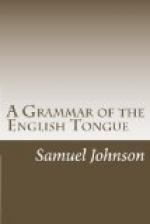It has sometimes in the end of words a sound obscure, and scarcely perceptible, as open, shapen, shotten, thistle, participle, metre, lucre.
This faintness of sound is
found when e separates a mute from a liquid,
as in rotten, or follows a
mute and liquid, as in cattle.
E forms a diphthong with a, as near; with i, as deign, receive; and with u or w, as new, stew.
Ea sounds like e long, as mean; or like ee, as dear, clear, near.
Ei is sounded like e long, as seize, perceiving.
Eu sounds as u long and soft.
E, a, u, are combined in beauty and its derivatives, but have only the sound of u.
E may be said to form a diphthong by reduplication, as agree, sleeping.
Eo is found in yeoman, where
it is sounded as o short; and in people,
where it is pronounced like
ee.
I.
I has a sound long, as f[=i]ne; and short as f[)i]n.
That is eminently observable
in i, which may be likewise remarkable in
other letters, that the short
sound is not the long sound contracted,
but a sound wholly different.
The long sound in monosyllables is always marked by the e final, as th[)i]n, th[=i]ne.
I is often sounded before r, as a short u; as flirt, first, shirt.
It forms a diphthong only with e, as field, shield, which is sounded as the double ee; except friend, which is sounded as fr[)e]nd.
I is joined with eu in lieu,
and ew in view; which triphthongs are
sounded as the open u.
O.
O is long, as b[=o]ne, [=o]bedient, corr[=o]ding; or short, as bl[)o]ck, kn[)o]ck, [)o]blique, l[)o]ll.
Women is pronounced wimen.
The short o has sometimes the sound of close u, as son, come.
O coalesces into a diphthong with a, as moan, groan, approach: oa has the sound of o long.
O is united to e in some words
derived from Greek, as oeconomy; but as
being not an English diphthong,
they are better written as they are
sounded, with only e, economy.
With i, as oil, soil, moil, noisome.
This coalition of letters seems to unite the sounds of the two letters, as far as two sounds can be united without being destroyed, and therefore approaches more nearly than any combination in our tongue to the notion of a diphthong.
With o, as boot, hoot, cooler; oo has the sound of the Italian u.
With u or w, as our, power, flower; but in some words has only the sound of o long, as in soul, bowl, sow, grow. These different sounds are used to distinguish different significations: as bow an instrument for shooting; bow, a depression of the head; sow, the she of a boar; sow, to scatter seed; bowl, an orbicular body; bowl, a wooden vessel.
Ou is sometimes pronounced like o soft, as court; sometimes like o short, as cough; sometimes like u close, as could; or u open, as rough, tough, which use only can teach.




